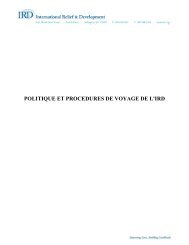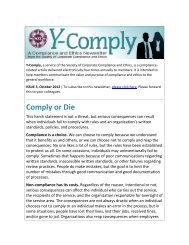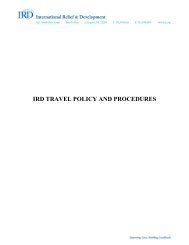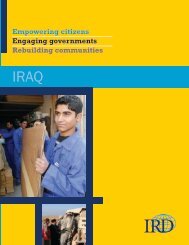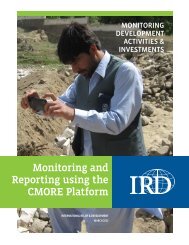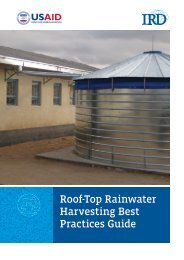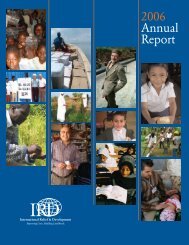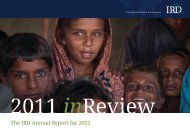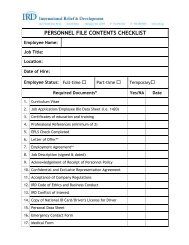IRD Vehicle Policy - International Relief & Development
IRD Vehicle Policy - International Relief & Development
IRD Vehicle Policy - International Relief & Development
Create successful ePaper yourself
Turn your PDF publications into a flip-book with our unique Google optimized e-Paper software.
Title: <strong>Vehicle</strong> <strong>Policy</strong> Effective Date: 11/22/10<br />
The driver is also responsible for driving in accordance with the normal driving regulations of the<br />
operating country regarding speed limits and should be fully aware that they are representing <strong>IRD</strong> at all<br />
times and perform and act accordingly, such as always being polite and courteous to other drivers and<br />
pedestrians, and parking the car in a safe place with the doors locked, windows closed and, where<br />
applicable, alarm activated. When parking overnight the vehicle is to be placed either in a guarded area<br />
or in an enclosed, locked area. Use of mobile phones when driving is actively discouraged, irrelevant of<br />
the country’s laws on the subject, only to be used when and if absolutely necessary.<br />
Key presses are to be situated in all field offices for staff to place vehicle keys when vehicles are not in<br />
use. Keys are not to be taken unless the relevant transport or Senior Manager has given approval.<br />
Project <strong>Vehicle</strong>s Donors are sensitive to how vehicles are used in projects. If you are working on a<br />
USAID project, check with your contractual obligations and with the USAID Mission to see what the<br />
vehicle control and acquisition policies are for your project. If in doubt, check with the <strong>IRD</strong> HQ<br />
Contracts and Grants Department. USAID’s vehicle philosophy is that vehicles are to be used to further<br />
projects goals and outputs and not for the personal benefit of project staff or government counterparts.<br />
This restriction on use may also stretch to not allowing the vehicle to leave the country without USAID<br />
approval. If this is required for genuine project needs (e.g. working on a cross-border project), then<br />
ensure you have received written approval from USAID in advance of your travel and that you have all<br />
relevant documents for driving in a different country (e.g. insurance coverage).<br />
Personal Use of Project <strong>Vehicle</strong>s. Some projects may allow personal use of vehicles and some projects<br />
may not. With the exception of emergency situations, all personal use of project vehicles must be paid<br />
for by the employee at a fixed rate per mile, this includes home to work and work to home transport.<br />
The fixed rate per mile will vary by year. For U.S. government funded projects, check with the local<br />
U.S. Embassy for guidance on appropriate rates. For all emergency cases, the instance must be<br />
documented in writing (including retroactive COP/CD approval) and retained in the relevant vehicle and<br />
individual’s personnel file.<br />
Where the donor allows, the COP only may approve personal use of vehicles as long as prior approval is<br />
provided, and the requested personal use will not negatively affect the official needs of the vehicle the<br />
project implementation. At some project sites, (such as in Iraq or Afghanistan) security concerns may<br />
permit use of project vehicles for other than project needs. This use must be documented in the vehicle<br />
logs (as must every trip made by the vehicle) and any personal use of the vehicle must be billed to the<br />
individual, preferably at the end of each month, based on the official USG per mile or per kilometer<br />
cost. Any authorized personal use of vehicles by consultants must also be billed to the consultant prior<br />
to his or her departure from country. The wording “Personal Use” must also be entered alongside the<br />
relevant vehicle log entries.<br />
For USAID projects, this is an absolute and can be flagged in an audit if the policy is violated. Records<br />
should be kept of personal mileage on project vehicles as well as records of the employee reimbursing<br />
the project.<br />
The same procedures for reimbursement must be followed as outlined above for all personal use of<br />
project vehicles, including the recording of the appropriate entries into logbook.<br />
If the COP and donor-approved personal use of a vehicle is more of a long-term arrangement, the driver<br />
is to periodically (not less than weekly) submit a report to the relevant finance manager/officer giving<br />
details of the vehicle number plate, dates used and kilometers/miles driven and attach photocopies of the<br />
appropriate pages of the vehicle book and reimburse the relevant amount of money owed based on<br />
Notice: A printed copy of this document may not be the latest version.<br />
Available online: https://portal.ird.org<br />
Updated: April 2012 6


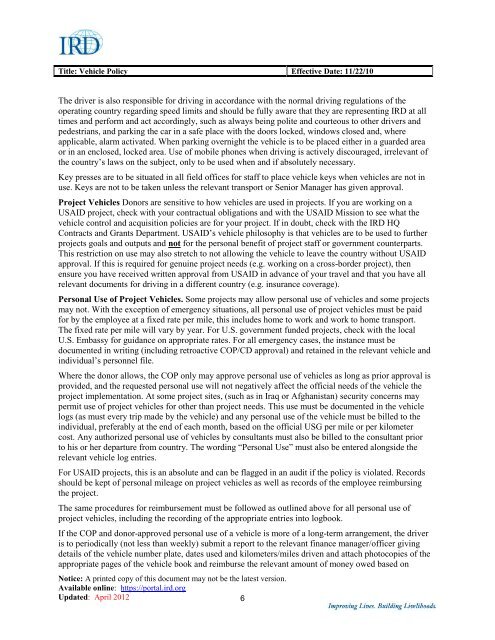
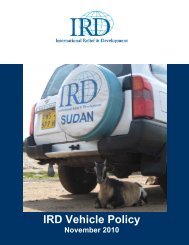
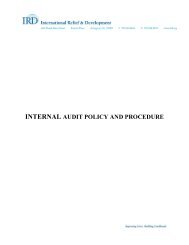
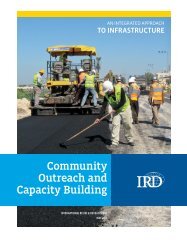
![Guide bonne pratique production d'oignon qualité_VF_4_2411012[1]](https://img.yumpu.com/23506639/1/184x260/guide-bonne-pratique-production-doignon-qualitac-vf-4-24110121.jpg?quality=85)
